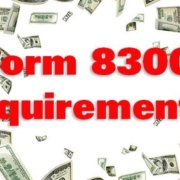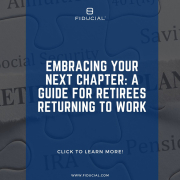Who is at Risk of The Trust Fund Recovery Penalty?
If you own or manage a business with employees, there’s a harsh tax penalty that you could be personally at risk for paying. The Trust Fund Recovery Penalty (TFRP) applies to Social Security and income taxes that are withheld by a business from its employees’ wages. The TFRP is dangerous because it applies to a broad range of actions and a wide range of people involved in a business. Fiducial has some answers to questions about the TFRP below.
What Actions Are at Risk for Penalty?
The TFRP applies to any willful failure by a business to collect, truthfully account for, and pay over taxes required to be withheld from employees' wages.
Why Is the Penalty So Harsh?
The government considers taxes as its property. As defined by the IRS, Social Security, and income taxes are called trust fund taxes. This is because the business holds the employee's money in trust until they make a federal tax deposit in that amount. The person found liable is personally penalized 100% of the taxes due, sometimes referred to as the “100% penalty”. In addition, the amounts the IRS seeks are usually substantial and they are aggressive in enforcing the penalty.

Who’s at Risk of the Penalty?
The penalty can apply to anyone deemed "responsible" for collecting and paying tax. Those responsible can include the corporation's officers, directors, shareholders, the partnership's partners, and any employee with related duties. Under certain circumstances, even voluntary board members of tax-exempt organizations have faced this penalty. Additionally, responsibility has been extended to professional advisors and family members closely associated with the business.
According to the IRS, responsibility hinges on one's status, duty, and authority. Anyone possessing the authority to ensure payment or non-payment of taxes may be considered responsible. Furthermore, a business often has multiple responsible individuals, each bearing the risk of the entire penalty. Just becoming aware of a failure to pay withholding taxes and having the ability to pay them makes you a responsible person even if you’re not directly involved in the payroll tax withholding process. While taxpayers held liable can sue other responsible individuals for contributions, they must undertake this action independently after paying the TFRP.
What is Considered Willful?
There does not need to be an overt intent to evade taxes. Simply paying bills or obtaining supplies instead of paying over-withheld taxes is willful behavior. And just because you delegate responsibilities to someone else doesn’t necessarily mean you’re off the hook. Failing to do the job yourself can be treated as willful.
Do you have questions about how the Trust Fund Recovery Penalty may affect your small business? Call Fiducial at 1-866-FIDUCIAL or request an appointment online to discuss your situation at one of our office locations.
Ready to book an appointment now? Click here to request an appointment with a Fiducial Advisor. Know someone who might need our services? We love referrals!









